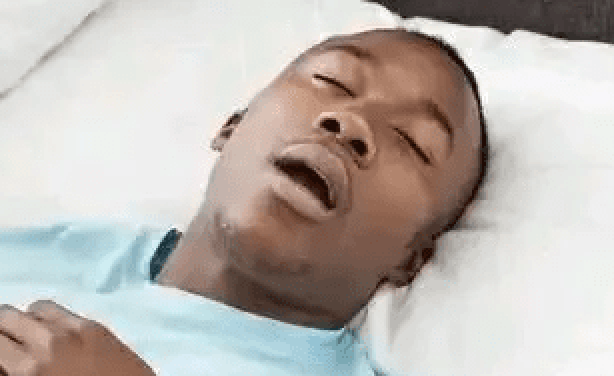Some common reasons why people die in their sleep have been revealed in this article..
Sleep is a necessity of life; however, people can and do die while sleeping.
The possibility of a sudden and unexpected death while sleeping is terrifying. It makes you feel anxious about the uncontrollable nature of life.
However, understanding the causes can help shed light on certain health risks, encourage awareness, and encourage proactive measures to prevent such unfortunate circumstances.
There are several common reasons why people die while sleeping; some are natural, and some are not.
According to report, the most common natural cause of death while sleeping cardiac arrest, sleep apnea and stroke
Below are common reasons while people die in thier sleep according to Researchers
1. Sudden Cardiac Arrest and Other Heart Problems
Heart problems, including sudden cardiac arrest, account for a large percentage of the instances of sudden death while people are asleep. It is estimated that 15-20% of all deaths worldwide are attributable to sudden cardiac death. Moreover, around 22% of sudden cardiac deaths are estimated to occur at night.
Heart issues that could cause sudden death at night include: Heart attacks
Cardiac arrhythmia, including ventricular tachycardia (heart beats too quickly) and ventricular bradycardia (heart beats too slowly)
2. Stroke
Stoke is another leading cause of dying in your sleep. When you have a stroke, a blood clot blocks the flow of blood to the brain, leading to brain cell death. According to the UK Stroke Association, 1 in 7 strokes occur during sleep.
Strokes can happen to anyone. However, your risk may be higher if you:
Have high blood pressure
Have high cholesterol
Have diabetes
Have untreated sleep apnea
Have too little or poor quality sleep
Catch yourself nodding off during the day
Sleep for more than one hour during the day (as an adult)
Are dehydrated
3. Obstructive Sleep Apnea
Obstructive sleep apnea is a risk factor on its own, in addition to increasing the risk of death from a heart event. People with obstructive sleep apnea stop breathing anywhere from 5 to 30 or more times per hour while they sleep, and are more than 2.5 times more likely than the general population to suffer sudden cardiac death between 12 a.m. and 6 a.m.
When left untreated, sleep apnea increases the risk of heart failure, stroke, coronary heart disease, and heart arrhythmias. According to the National Commission on Sleep Disorders Research, more than 38,000 people die from heart disease that’s complicated by sleep apnea in the United States each year.
Heart problems, strokes, and sleep apnea are three of the top causes of dying in your sleep. However, there are several other reasons why someone mightn’t wake up.
4. Lung Problems
Lung problems, including chronic obstructive pulmonary disease and congenital central hypoventilation, can cause people to lose too much oxygen and die in their sleep.
5. Seizures
People who have seizures in their sleep may die suddenly from low blood oxygen levels or serious injuries.
6. Sleep Disorders
People who sleepwalk or have REM sleep behavior disorder can injure themselves accidentally or even walk out of a window while sleeping, causing death.
7. Sedative Overdose
People who accidentally overdose on sedatives can fall asleep and never wake up.
8. Narcotic Medication Use
Narcotics can cause respiratory depression, which can lead to respiratory arrest and cardiac arrest if left untreated.
9. Choking in Your Sleep
It’s possible to choke yourself to death while you sleep, especially after a seizure, after vomiting due to heavy drinking, or when sleeping with food or a throat lozenge in your mouth.
10. Suffocation
Babies under one year old can suffocate on pillows or bedding in their sleep, or can experience sudden cardiac death from respiratory or brain-related causes. Sudden infant death syndrome (SIDS) can’t always be prevented, but adopting safe sleep measures like placing a baby on its back can help.
11. Carbon Monoxide Poisoning
A buildup of carbon monoxide in the air from a fireplace, candles, gas stove, gas heater, vehicle that’s left running, generator, or other sources of fumes can cause you to die in your sleep. According to the Centers for Disease Control, more than 400 people in the U.S. die from accidental carbon monoxide poisoning each year with a peak in deaths in January.
12. Long Sleep Duration
People who sleep for more than 9 hours per night have a higher risk of death from all causes. Moreover, people who take unplanned naps or nap for more than one hour during the day have a higher risk of acute stroke.
While passing away peacefully during sleep is relatively rare, understanding the potential causes can help safeguard against potential health risks.
By acknowledging the importance of leading a healthy lifestyle, being aware of our family history, and heeding warning signs, we can take proactive measures to minimize the possibility of experiencing these unfortunate circumstances.
While sudden death while sleeping can happen even to healthy people, evaluating and addressing any known risk factors can reduce your risk of leaving this world too soon..









